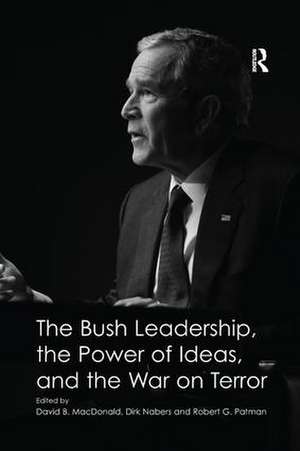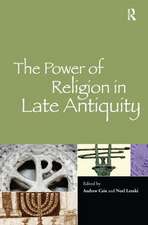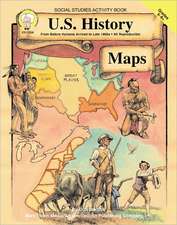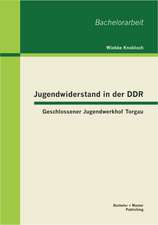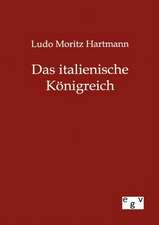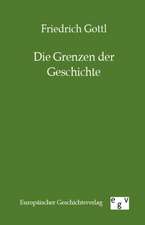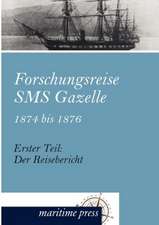The Bush Leadership, the Power of Ideas, and the War on Terror
Autor Dirk Nabers Editat de David B. MacDonalden Limba Engleză Paperback – 26 aug 2016
| Toate formatele și edițiile | Preț | Express |
|---|---|---|
| Paperback (1) | 469.34 lei 6-8 săpt. | |
| Taylor & Francis – 26 aug 2016 | 469.34 lei 6-8 săpt. | |
| Hardback (1) | 1058.79 lei 6-8 săpt. | |
| Taylor & Francis – 28 iun 2012 | 1058.79 lei 6-8 săpt. |
Preț: 469.34 lei
Nou
Puncte Express: 704
Preț estimativ în valută:
89.81€ • 97.86$ • 75.68£
89.81€ • 97.86$ • 75.68£
Carte tipărită la comandă
Livrare economică 23 aprilie-07 mai
Preluare comenzi: 021 569.72.76
Specificații
ISBN-13: 9781138274808
ISBN-10: 1138274801
Pagini: 220
Dimensiuni: 156 x 234 x 12 mm
Greutate: 0.45 kg
Ediția:1
Editura: Taylor & Francis
Colecția Routledge
Locul publicării:Oxford, United Kingdom
ISBN-10: 1138274801
Pagini: 220
Dimensiuni: 156 x 234 x 12 mm
Greutate: 0.45 kg
Ediția:1
Editura: Taylor & Francis
Colecția Routledge
Locul publicării:Oxford, United Kingdom
Public țintă
PostgraduateCuprins
Contents: Introduction: the Bush leadership, the power of ideas and the war on terror, David B. MacDonald, Dirk Nabers and Robert G. Patman; Globalization, the post-Cold War era, and visions of US leadership, Robert G. Patman; Historical analogies and leadership in Bush administration foreign policy, David B. MacDonald; Identity construction in US foreign policy during the Bush years, Dirk Nabers; George W. Bush, Iran and the squandering of America's soft power, David Patrick Houghton; Unilateralism across the border: the US-Mexico relationship, David Lebow and Richard Ned Lebow; Rogue policy: Bush and Iran, Michael Rubin; Bush's legacy and Obama's conception of American leadership, Nicholas Kitchen; Domestic politics and US leadership after September 11, James M. McCormick; 'Can't anybody here play this game?' America's post-Cold war leadership and the Bush doctrine after 9/11, Martin N. Stanton; Conclusion: power and ideas in the Bush era, David B. MacDonald, Dirk Nabers and Robert G. Patman; Index.
Notă biografică
David B. MacDonald, University of Guelph, Canada, Dirk Nabers, Christian-Albrechts-Universität zu Kiel, Germany and Robert G. Patman, University of Otago, New Zealand
Recenzii
'This book is a thematically tightly integrated, timely contribution to our understanding of American foreign policy after 9/11. An excellent set of chapters advance our understanding of political leadership, the power of ideas, ideas of power, and the war on terror. The three editors have put together a set of first-rate essays that will be of great interest to both scholars and students.' Peter J. Katzenstein, Cornell University, USA 'These important essays shed light on the complex relationship between power, ideas, and leadership. After careful analysis of the Bush years, the editors show conclusively that no country, however large, can ignore the power of ideas if it wants to be an effective leader.' Joseph S. Nye, University Distinguished Service Professor, Harvard, and author of The Future of Power
Descriere
This volume explores the relationship between President George W. Bush's leadership, the administration's stated belief in the power of ideas (and the ideas of power) and its approach to the war on terror. Drawing on the international expertise of ten American foreign policy and security specialists, this incisive and timely book combines theoretical perspectives on political leadership with rigorous empirical analysis of selected aspects of the Bush administration's post 9/11 foreign policy.
